Tricycles and other three-wheeled vehicles are a common sight on our roads.
They help many Filipinos earn a living and give communities a cheap way to get around.
To improve safety and ensure fair use of roads, the Land Transportation Office (LTO) has updated its rules for these vehicles.
Through Memorandum Circular No. 2020-2227, the LTO reclassified three-wheeled vehicles and clarified rules on registration, road use, and safety.

What Counts as a Three-Wheeled Vehicle?
The LTO now groups three-wheelers into two main types:
1. Motorcycle-Tricycle
These are vehicles that look like your usual tricycle, with a motorcycle sidecar.
They can be either for private use or for-hire.
2. Non-Conventional Motorcycles
These are newer or imported models that don’t look like the usual tricycle.
For example, they might have two wheels in front and one at the back.
These are further broken down into three subcategories:
- L5: Symmetrical three-wheeled vehicles
- L6: Light quadricycles
- L7: Heavy quadricycles
If you’re unsure which group your vehicle belongs to, it’s best to check with your local LTO branch.
They can tell you what category fits your model and what rules apply to you.
How to Register Your Tricycle or Three-Wheeler
Registration is now stricter and more standardized.
All three-wheeled vehicles must be registered every year.
This includes both private and for-hire tricycles.
What’s new is that your registration fee may now match what light motor vehicles pay.
Yes, this might be a bit more expensive.
But it also means your vehicle can now access more roads and get better recognition from local authorities.
To register, prepare the following:
- Proof of ownership
- Valid ID
- Latest OR/CR (if renewing)
- Inspection certificate from an LTO-accredited center
- Emission test results
- Payment for fees
Registration helps prove your vehicle is road-worthy and legal to drive.
It also protects you in case of road incidents or inspections.
READ ALSO: How to Get an LTO Motorcycle Registration & OR/CR
Where Are You Allowed to Drive?
Here’s where things get a little tricky—but also more flexible.
Before, many tricycles were banned from big roads and highways.
Now, access rules are partly decided by your Local Government Unit (LGU).
LGUs can allow certain three-wheeled vehicles on secondary national highways.
However, most primary national roads are still off-limits unless your LGU has special rules.
So even if you register your vehicle with the LTO, it’s your LGU that decides where exactly you can drive.
Some roads may still have signs banning tricycles or three-wheelers.
Watch out for these and respect them, or you might get flagged.
Always check with your barangay or municipal office if you’re not sure which roads you’re allowed to use.
Safety Rules You Must Follow
All three-wheeled vehicle drivers must follow the same safety laws as other drivers.
This means:
- Carry a valid driver’s license
- Wear a helmet (if required by local laws)
- Make sure lights, brakes, and horns work properly
- Avoid overloading passengers or cargo
- Follow traffic signs and rules
Even if your tricycle is for private use, safety is still your responsibility.
For-hire drivers must also avoid reckless driving, especially when carrying passengers.
The LTO and local enforcers may inspect your vehicle anytime.
Being prepared and driving responsibly protects both your livelihood and the lives of others.
Why These Rules Matter
You might ask, why is the LTO doing all this?
It’s not just about collecting fees.
These rules are meant to make roads safer and more organized.
For example:
- Tricycles in poor condition can cause accidents.
- Overloaded vehicles damage roads and risk tipping over.
- Some drivers use three-wheelers to cut through banned areas, causing traffic problems.
By registering your vehicle and following the rules, you help make the roads safer for everyone.
You also avoid being stopped by officers, fined, or having your vehicle impounded.
Frequently Asked Questions
1. Can I use my tricycle for deliveries instead of passengers?
Yes, but make sure to register it properly and follow any LGU rules about cargo types and routes.
2. What happens if I skip registration for one year?
You may be fined and required to pay penalties for the months missed. You also risk getting flagged by LTO officers.
3. Are electric tricycles included in these rules?
Yes. E-trikes must also be registered and may fall under the Non-Conventional category depending on their design.
4. Can I apply for a franchise to operate my tricycle for-hire?
Yes, but this is handled by your LGU. Visit your local transportation office to ask about the process and requirements.
Conclusion
The LTO’s updated rules for three-wheeled vehicles are here to stay.
While some may feel the changes are strict, they also open the door for safer and wider use.
If you’re a tricycle driver or owner, it’s important to know your vehicle’s category, keep it registered, and follow both national and local road rules.
This way, you avoid problems and keep earning from your vehicle without interruption.
A little effort today can save you big headaches tomorrow.
And when in doubt, ask.
Your LGU and LTO officers are there to help—not just to fine you.